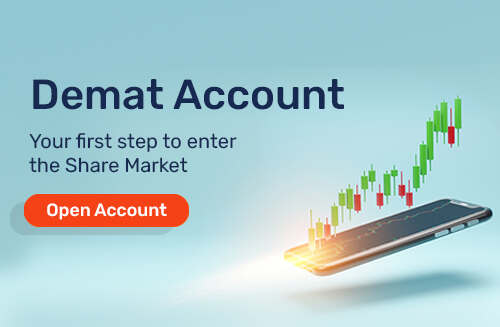A Demat account provides you with the facility of storing shares and other securities in one place. A Demat account stands for a Dematerialized account. Using a Demat account, you can convert your physical shares into electronic form, known as Dematerialization. In contrast, you can convert your electronic shares into physical form, known as Rematerialization. You may now look for how to open a Demat account. This article will brief you about it in detail.
National Securities Depository Limited (NSDL) and Central Depository Services Limited (CDSL) maintain the Demat system in India. But, you can open a Demat account with a Depository Participant (DP) associated with either CDSL or NSDL. CDSL predominantly allows you to invest in the Bombay Stock Exchange Limited (BSE), while NSDL predominantly allows you to invest in the National Stock Exchange Limitd (NSE).
If you are looking to open a Demat account in a hassle-free way, you must choose an easy-to-understand and easy-to-understand online stock trading app. With Kotak Stock Trading App by Kotak Securities, you can open a Demat account easily and quickly. You can even open a Demat account using their website. Kotak Securities is one of India’s leading stockbroking firms with more than two decades of existence. It is a platform with more than 3.5+ Million customers.
With Kotak Stock Trading App, you can easily keep your eyes on BSE and NSE share price movements. Plus, you can invest in various investment options such as Equity Shares, IPOs, Mutual Funds, SIP, ETFs, Bonds, and so on.
Here are the different types of financial securities in which you can invest.
Stocks: Shares mean units of equity ownership in an issuing company, while stock is a collection of shares. Stocks are widely known as equity shares. Stock investments allow an investor to buy or sell stocks from or to another investor in the secondary market in order to get good returns.
IPOs: An initial public offering is commonly known as IPO, by which a privately-owned company becomes a publicly traded company. It allows the company to sell its shares for the first time. Investors can purchase IPO shares directly from the company at the lowest price in the primary market and sell them at a significant price in the future.
Futures & Options: Futures and options are derivatives contracts, commonly known as an F&O. Two or more parties can enter a derivative contract to buy or sell an underlying asset (stock, commodity, or any financial security) at an agreed price on a fixed future date.
Mutual Funds: A mutual fund is an investment vehicle that allows a professional fund manager to collect funds from a group of investors with a common objective and further invest in various stocks to ensure good returns in the future. Profits will be proportionally distributed amongst investors.
SIP: A Systematic Investment Plan is shortly known as a SIP that allows you to regularly invest in mutual funds with a low capital of INR 500. There are a lot of SIP options in the market to invest in and yield good returns over the time.
ETFs: An exchange-traded fund (ETF) is a type of investment that is similar to a mutual fund. In an ETF, a fund house will pool money from investors and further invest in a particular or a group of indices, sectors, commodities, etc. This kind of investment is also similar to stock investment because you can trade an ETF on a stock exchange, just like how you trade regular stocks.
Currency: Currency trading is also known as foreign exchange trading or forex trading. This market is global and decentralized, which allows you to trade currencies. Currency trading works in pairs (EUR/USD, USD/CHF, USD/JPY, and GBP/USD), where you will have to exchange one currency for another currency.
Commodity: Commodity trading allows you to trade different types of commodities and their derivatives products in the commodity market. A commodity can be any raw material or primary agricultural product. Therefore, investing in commodities is a great way to diversify your asset portfolio.
Smallcase: Smallcase investing is an advanced way to enter the stock market. A smallcase has a collection of upto 50 stocks based on a theme, idea or strategy. At present, you can choose only NSE stocks when investing in smallcases.
Global Investing: Global investing is a strategy of adding various global-based investment options to your portfolio. Such investment options can be Mutual Funds, Exchange-traded funds, or any direct investments in foreign markets.
A Hassle-free Way to Open a Demat Account in India.
Here are the following ways for a Demat account to open with Kotak Securities.
Open a Demat Account Using Kotak Stock Trading App
- Download the app from Google Playstore
- Create your account
- Get credentials
- Start trading or investing in your favourite stocks.
Open a Demat Account Using Kotak Securities Website
- Enter your mobile or email and get verified
- Input required basic details
- Upload all your docs using Digi Locker
- Submit e-signature
Before opening a Demat account, ensure you have completed your Know Your Customer (KYC) and authenticated your identity.
Conclusion
In today’s time, it is essential to have a Demat account to participate in the stock market. Using Kotak Securities’ Kotak Stock Trading app or its website, you can explore a lot of investment options to choose from and buy the right investment options for you.





























